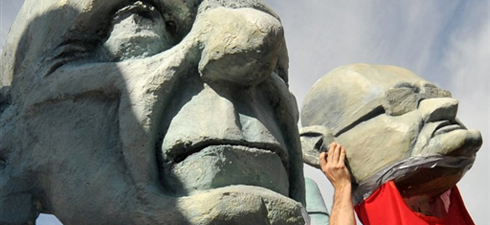Back in 1995, the Dayton peace talks came up with a formula to end the 1992–95 War in Bosnia, but that was not enough to ensure the development of democracy and the rule of law in the fledgling nation, which was subsequently partitioned along ethnic nationalist lines. The Western leaders who drew up the accords failed to insist on a mechanism to adapt the constitution framed at Dayton to future developments on the ground in Bosnia.
Not only does the constitution legitimise the territorial division of Bosnia and Herzegovina into two so-called “entities”, the Serb-dominated Republika Srpska and the Federation of Bosnia and Herzegovina (informally known as the Bosniak-Croat Federation). It leaves ethnic nationalist groups too much room for blockades should they see their interests at risk. In other words, the existing constitution actually impedes the development of a culture of compromise, a vital prerequisite for the nation’s further integration into the EU community.
Doubts over Carl Bildt's strategy
Not only that, it runs counter to the (human rights) principles enshrined in European constitutions. To be sure, the new constitutional initiative does raise the decisive question: can the country fall in with the EU community or not? However, the way the talks have been going so far gives grounds for reasonable doubts about Carl Bildt’s strategy and the Brussels negotiators’ foreign policy competence.
After all, they should have known some politicians would reject any changes out of hand. Before the negotiations even got started, for example, Milorad Dodik, the prime minister of the autonomous Serb republic, publicly declared he sees no need whatsoever for a new constitution. Despite all his xenophobic and jingoistic rhetoric, what Dodik is really after becomes clear in the current visa debate. In order to get Brussels to ease the visa regulations, a step of tremendous importance to everyone, the national parliament would have to pass the anti-corruption law. But passage of the bill will depend on the so-called “entity vote”. In a word, Dodik, with his minions, can stave off the proposed legislation even if the vast majority of parliament endorses it. And Dodik is naturally opposed because he is personally implicated in a whole slew of corruption scandals. The EU should have taken all that into account before the new talks began.
EU has ruined its chances
Furthermore, a constitutional debate without open public discussion is a dubious undertaking at best. Bildt didn’t even consult with the Office of the High Representative (established under the Dayton Accords to “implement peace” in Bosnia), the most important international institution on site. By snubbing an institution that is so vital to the country’s stability, he may well relegated the OHR to the sidelines for good. Above all, the whole process profoundly unsettled the Bosnian population and the non-nationalistic public; recently, there was even some hysterical talk about the possibility of another war breaking out.
The failure of the constitutional debate will hamstring the government in Bosnia and Herzegovina, rendering it even more powerless than it is now and abetting mobster nationalists, shady religious leaders, and politicians in the pockets of tycoons, who can now go on manipulating the helpless and impoverished masses who are at their mercy. The EU and Carl Bildt have, regrettably, passed up an opportunity to ameliorate the situation. The only hopes left are the evolving civilian society, the US – and, quite seriously now, the Bosnian national football club, which could actually change a great deal if it qualifies for the World Cup 2010.
FROM BOSNIA
No, nothing's changed
“The Butmir talks, widely viewed as the last chance to save Bosnia and Herzegovina, have really and truly come a cropper,” reports Oslobodjenje. In the Sarajevo newspaper’s assessment, “the international community has suffered a huge political failure in Bosnia and Herzegovina, its biggest political laboratory since World War II.(…) ‘What begins badly, ends badly’, says the old saw. But for us everything began in Dayton, where Bosnia and Herzegovina was probably saved, but at the cost of a crippling handicap. All the subsequent efforts did not suffice to render the country viable. Butmir is but the reflection of these illusory efforts. Nothing has changed in Bosnia and Herzegovina: the Serbs swear by the Dayton Accords alone, which remain a source of great frustration to the Bosnians and Croats. And their entrenched positions haven’t budged an inch, even as the country edges ever closer to the brink of disaster. We have the impression everyone is waiting for it to fall and sunder in the hopes that things will finally fall into place. Waiting for Europe or the United States to do it for them is the habitual approach of the oligarchies in power. For the rest, the political elites that emerged from the war confine themselves to taking maximum advantage of their stint in power. And they’re doing a pretty job of that.”
Was this article useful? If so we are delighted!
It is freely available because we believe that the right to free and independent information is essential for democracy. But this right is not guaranteed forever, and independence comes at a cost. We need your support in order to continue publishing independent, multilingual news for all Europeans.
Discover our subscription offers and their exclusive benefits and become a member of our community now!












